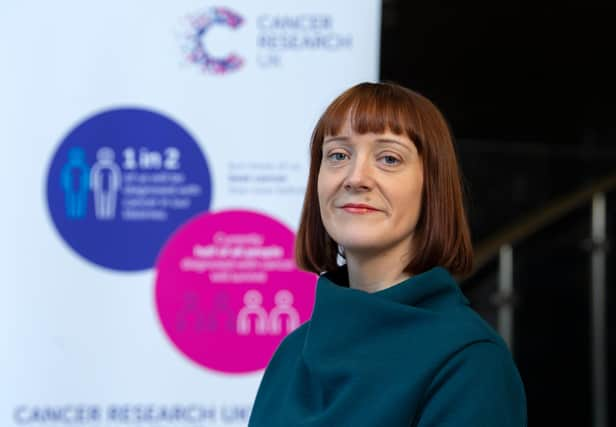£17 million announced in new funding for Scottish cancer services to recover from Covid-19


This figure is in addition to £97.5 million of committed spending, and will be subject to parliamentary approval.
The Action Plan for Cancer Services published on Wednesday outlines a two year proposal for the recovery of cancer services in the wake of the pandemic, running to March 2023.
Advertisement
Hide AdAdvertisement
Hide AdSome aspects of the plan have been welcomed by cancer charities, but Cancer Research UK warned it is “not clear” how some of the biggest challenges in cancer care will be tackled, including staff shortages present before the pandemic.
The plan includes the introduction of Early Cancer Diagnostic Centres, where patients with non-specific symptoms such as weight loss, fatigue and nausea can be assessed in a bid to reduce footfall in hospitals and the need for multiple referrals.
There is a focus on lung cancer, the most common form in Scotland, whose symptoms the Action Plan notes are similar to those of Covid-19. The plan includes a £500,000 lung cancer awareness campaign in 2021, alongside a feasibility study with Edinburgh University to look at introducing lung health checks in Scotland.
Between now and September 2021 the Scottish Government will also work with National Services Scotland to assess potential further investment into robotic surgery.
Advertisement
Hide AdAdvertisement
Hide AdIn her ministerial forward to the report, Health Secretary Jeane Freeman said: “This Action Plan for Cancer Services will review the new circumstances in which we operate, including positive innovations that have emerged in the NHS, and introduce a wide range of new actions and areas of focus for cancer services.
She added: “I’ve been very clear that cancer must remain a priority within our NHS, and delivering this plan will be crucial to that continued prioritisation, while taking all opportunities to further improve patient’s experiences of our cancer services.”
Marion O’Neill, spokesperson for Cancer Research UK in Scotland, said: “While there are some welcome commitments here, including plans to set up one stop shops for cancer diagnosis, it isn’t clear how some of the biggest challenges facing cancer services today will be tackled.
“What we don’t see here is how to address the acute staff shortages that existed even before the pandemic struck. We know that when cancer is diagnosed at an early stage, treatment is more likely to be successful and so efficient access to cancer services can be lifesaving.
Advertisement
Hide AdAdvertisement
Hide Ad“Now is the time for the Scottish Government to invest in the cancer workforce, so they can deliver on the most impactful aspects of this plan and ensure cancer patients don’t wait too long.”
Kate Seymour, head of policy at Macmillan, said: “It’s not enough for the cancer care system to get back to the way it was before the pandemic, particularly when we expect a deluge of people into the system, diagnosed late with more advanced cancers that require more invasive treatment with longer term consequences for their physical, emotional and financial health.
“We welcome the recognition of this challenge in the plan and we’re pleased to see the government’s recommitment to working with Macmillan to make Scotland the first country in the UK where every cancer patient is offered support for all their needs.”
